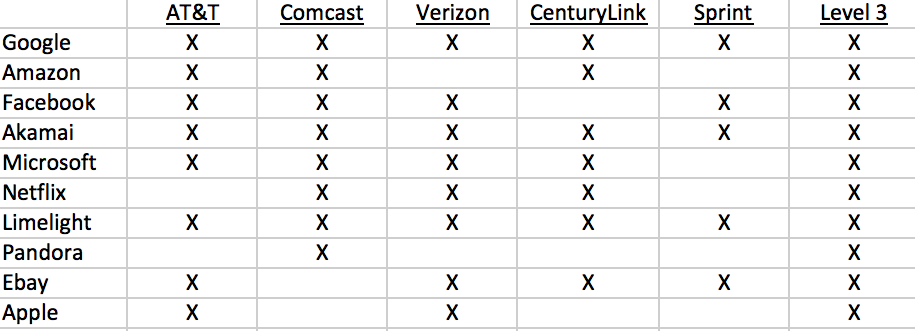Chart Shows Which Content Owners Have Direct Interconnect Deals With ISPs
With all the confusion in the media around the topic of interconnects, I thought it would be helpful to show exactly which content owners have done direct interconnects with ISPs. While some members of the media want to claim that content is exchanged on the Internet in a “secretive nature”, the fact is, it’s not a secret at all. If you know how and where to look, you can easily see what is taking place between networks. All of the information I provide in the chart below is from public information that anyone can lookup simply by knowing the networks Autonomous System number (AS) and looking at their peers. You don’t have to be a networking engineer to look at BGP relationships and see what is taking place. It’s all public info.
The search results won’t come right out and say which relationships are settlement free versus settlement-based, but you can infer from traditional business relationships and public peering policies, who’s paying whom. Not to mention, the companies who pay for these interconnect relationships will tell you which ISPs they are paying, and which one’s they aren’t, if you have a good relationship with them. Anyone involved in building out networks for a living understands how this has worked since the late 90’s. It is not a secret. Many members of the media simply don’t have any insight into these deals because many of them don’t cover infrastructure topics for a living. But just because they don’t know themselves, does not mean that these deals happen in secret.
Based on the AS lookups I did, here are the companies that have direct interconnects with various ISPs. I didn’t look at every ISP out there or every content owner, simply some of the larger ones.
Updated 6:08pm – For those asking why Level 3 is on the list when they are not an ISP, I wanted to show that there are many forms of direct business relationships between companies for both transit and paid peering.
What you can see on the chart is that all of the major content owners have negotiated direct business relationships with multiple ISPs for their CDN. There are various business and technical reasons why they pick one ISP over another, but there are a lot of these deals in the market and have been for many, many years. Some ISPs in the U.S. have dozens of paid interconnect deals in place. Multiply that by the number of ISPs in the U.S., and the number of paid interconnect deals is probably close to 100. So for Netflix’s CEO to call their paid interconnect deal with Comcast “unprecedented,” is intentionally misleading.
Each of the X’s in my chart shows that large content providers are unafraid to connect with large ISPs, most have been doing so longer then Netflix, and none have found the need to seek intervention. Of course that does not tell you the size of the deal, how much the ISP is charging or any of the other business terms, but no one should argue or debate that these deals aren’t common, continue to happen and are how networks, especially in the U.S., have connected to one another for almost twenty years.
Part of the argument by many around interconnects is that it costs the ISPs almost nothing to turn up ports on their network, or they say that ISPs have “unlimited capacity”. Neither would be accurate. There is a direct cost to the ISP to add ports and backhaul infrastructure to bring traffic all the way into their network. For anyone to say that the costs should now shift to the ISP because it’s “cheap” to them, or “doesn’t cost them much”, it’s not a valid argument. If that’s the argument some want to use, then by the same token I could say that if I have a letter to deliver to someone’s house and the postman is already going there, then it costs them next to nothing to deliver my letter and my cost should be free. It’s simply not a logical argument.
Put it another way. What if Google, Apple, Netflix, Facebook, Ebay and Microsoft all said to the same ISP that they want unlimited peering capacity, in multiple cities in the U.S. Would anyone think that would be fair to the ISP and that they should have to spend the money to fulfill all of those requests, at no cost to the content owner? Would this entitlement give major content owners special treatment over a smaller startup competitor? I think most would agree that’s not fair, yet that is what many are suggesting should happen. And using the argument that the ISP is already charging consumers for access to the Internet is also not valid. Your connection from your ISP is about broadband Internet. It is not about the service infrastructure cost for third parties.
Historically companies like Netflix have always paid for their transit connectivity, or Internet delivery costs. The 60% of broadband customers who do not use Netflix, should not suddenly have to pay for the network transit/interconnect costs of others because Netflix feels their Internet costs should now shift to all ISP customers. Perhaps someone wants to use Hulu, Amazon or consume no video at all. Each of these companies has a cost for their service infrastructure and paid interconnect deals are not increasing that cost. These costs are staying where they have always been, included within the specific service. Saying that it is new or unprecedented is just not true.
Follow up questions can be put in the comments section below or you can email me or call me (917-523-4562) at any time.

